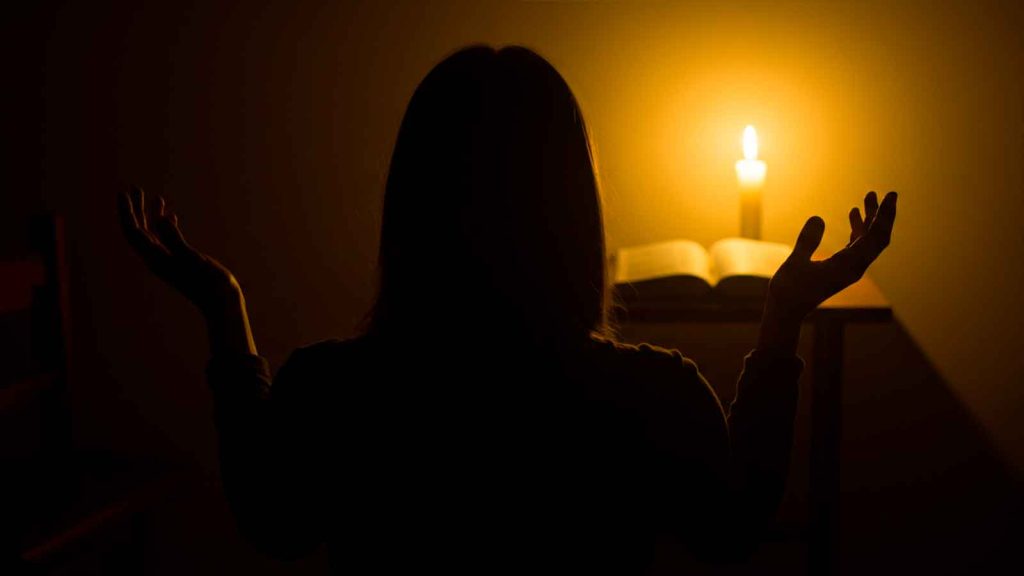Psalm 134 opens the doors to a unique worship experience, marking the close of the songs of pilgrimage and inviting every reader to celebrate the divine presence even in the quietest hours.
In this article, we will follow a path of study, meditation, and practical application, maintaining the ideal density of the keyword Psalm 134 and highlighting semantically related expressions such as night praise and servants of the Lord, in order to deepen our understanding of this brief yet meaningful text.
Psalm 134 Complete
¹ Behold, bless the Lord, all you servants of the Lord, who stand by night in the house of the Lord.
² Lift up your hands in the sanctuary and bless the Lord.
³ May the Lord, who made heaven and earth, bless you from Zion.

Psalm 134 Explained Verse by Verse
Psalm 134:1
Behold, bless the Lord, all you servants of the Lord, who stand by night in the house of the Lord.
This verse summons God’s servants who remain in the temple at night to praise the Lord. It is a call to continuous worship, even in moments of silence and darkness. True spirituality is not confined to daylight but extends into the night watches. Praising the Lord at night expresses vigilance, faithfulness, and constant dedication to divine service.
Psalm 134:2
Lift up your hands in the sanctuary and bless the Lord.
Here the psalmist invites a visible act of worship. Lifting hands in the sanctuary represents surrender, reverence, and sincere prayer. The physical posture reinforces the heart’s attitude, uniting body and soul in exalting God. Blessing the Lord with gestures makes devotion livelier and deeper, creating an atmosphere of communion in the sacred space.
Psalm 134:3
May the Lord, who made heaven and earth, bless you from Zion.
The final verse brings God’s response to worship: His blessing. By emphasizing that the Lord is the Creator of heaven and earth, the psalm strengthens confidence in divine power and generosity. The reference to Zion recalls the place of God’s presence and covenant with His people. The blessing from Zion symbolizes care, protection, and prosperity for all who worship sincerely.
Psalm 134 at the Heart of the Songs of Pilgrimage
Psalm 134 is the final step of the series known as the songs of pilgrimage. These psalms accompanied ancient caravans of Israelites on their way to Jerusalem, forming a spiritual soundtrack that blended joy, expectation, and reverence. By concluding this set, Psalm 134 provides a climactic call to blessing, as if saying, “We have finished the journey, but the praise continues.”
Structure and Main Message of Psalm 134
In its three verses, Psalm 134 follows a compact structure:
- A call to the servants of the Lord to praise during the night.
- An exhortation to lift their hands in the sanctuary.
- A blessing from Zion upon all worshipers.
Though concise, Psalm 134 condenses powerful ideas: constant worship, active participation of the priestly community, and the transmission of divine blessings.

Historical Context of Psalm 134
To understand why Psalm 134 emphasizes night praise, we must return to the post-exilic period. Levites and priests served in shifts, including the night watches. Thus, Psalm 134 reinforces that worship keeps no clock. Night, a symbol of rest, becomes a stage of continuous gratitude. Reading Psalm 134 reminds us that our spirituality must never fall asleep.
The Importance of Night Praise
The theme of night praise resonates throughout the Bible. In Exodus, the Passover lamb was eaten at nightfall. In the New Testament, Paul and Silas prayed in prison at midnight. Psalm 134 echoes this tradition: when the world grows quiet, the voices of the devoted still praise.
Hidden Theological Meanings in Psalm 134
Even brief, Psalm 134 offers riches:
- Universality of worship: Any hour is the right hour to worship.
- Expanded priestly community: In a sense, we all are servants of the Lord.
- Reciprocity of blessings: The people bless God, and God returns the blessing.
The Word “Blessing” in Psalm 134
In this song, the Hebrew root for “to bless” appears with a double sense. First, the worship leaders bless the Lord; then the Lord returns His favor. Psalm 134 shows a cycle of spiritual giving, encouraging each reader to enter this stream of praise and gratitude.
Comparisons Between Psalm 134 and Other Songs
A Dialogue with Psalm 122
Psalm 122 opens the journey of the songs of pilgrimage with an excited call: “Let us go up to the house of the Lord.” It expresses the longing to be in God’s presence, anticipating the sacred experience of the temple. Psalm 134 closes that cycle, describing what happens once the faithful are in the temple: continuous worship, even at night. The relationship between the two shows that praise does not end upon arrival but continues in devotion.
The Continuity of Psalm 133
Psalm 133 celebrates brotherly unity, comparing it to the precious oil on Aaron’s beard. That image of social and spiritual harmony points to an atmosphere of communion. Next, Psalm 134 highlights those who maintain that atmosphere: the servants who stay in the temple at night, sustaining worship on behalf of the whole community. The unity celebrated in the previous psalm is nourished by the vigilance and faithfulness of the worshipers.
A Thread Running Through the Songs
Among Psalm 122, Psalm 133, and Psalm 134 runs a spiritual thread: God as the source and center of community life. He is the reason for gathering, unity, and worship. The songs complement each other, forming a trail of spirituality that starts with expectation, passes through fraternity, and culminates in persevering praise.
New Testament Parallels
The Continuous Sacrifice of Praise
The message of Psalm 134 finds echoes in the New Testament. Hebrews 13:15 states, “Through Jesus, therefore, let us continually offer to God a sacrifice of praise—the fruit of lips that openly profess his name.” This exhortation reinforces that praise is not occasional but constant. Just as the servants praised during the night, modern Christians are called to keep their hearts always turned to the Lord.
From the Physical Temple to Daily Worship
Psalm 134 speaks of those who worship in the temple. The New Testament expands this idea, teaching that every Christian becomes a temple of the Holy Spirit. Worship is no longer confined to a physical space; life itself becomes liturgy. The gesture of lifting hands in worship, described in the psalm, translates today into attitudes of surrender, prayer, and praise in daily life.

Practical Applications of Psalm 134 Today
The invitation of Psalm 134 is not restricted to ancient priests. It continues to echo in the hearts of all who wish to cultivate a life of sincere worship amid modern routines. The psalm invites us to live praise as a lifestyle, not merely as a liturgical practice.
Making the Day a Continuous Space of Praise
The spirituality proposed by Psalm 134 begins in the morning and spans every hour. Upon waking, a simple “Thank you, Lord” already aligns the heart with the purpose of praise. At day’s end, repeating this gesture seals the cycle with gratitude. Small acts—listening to hymns while working or reciting a verse during breaks—help keep praise alive throughout the day.
Creating Night-Time Prayer Rhythms
Focusing on worship at night may seem distant from modern reality, but it is perfectly applicable. After dinner or before sleep, setting aside silent moments for prayer, meditation, or reading a psalm creates an atmosphere of inner peace. These moments become a refuge, connecting the believer with serenity and the presence of God even after a busy day.
Turning the Home into a Sanctuary
Even far from physical temples, it is possible to create worship spaces at home. A corner with a Bible, a candle, or symbolic objects can serve as a visual reminder of the divine presence. Attitudes of gratitude, kindness, and prayer transform the home into a spiritual environment, echoing the constant praise encouraged by Psalm 134.
Everyday Small Practices
Read Psalm 134 Before Sleeping
Setting aside a moment before nighttime rest to read Psalm 134 helps close the day with purpose. The calm reading of the text can prepare mind and heart for a more peaceful sleep centered on God.
Keep a Candle or Soft Light On
A simple symbolic gesture, such as leaving a soft light on through the night, can represent the reminder that God watches over us even while we sleep. This silent light becomes a sign of worship that continues in the quiet.
Record Daily Blessings in a Gratitude Journal
Keeping a gratitude journal is a simple yet profound practice. Writing down three blessings each day trains the eye to perceive God’s actions in small things. Over time, this practice fosters contentment and strengthens faith, aligning life with the spirit of continuous praise in Psalm 134.
Literary Analysis of Psalm 134
Psalm 134 uses synonymous parallelism, reinforcing its message through repetition. Hebrew poetry values reiteration of ideas in different lines—a device that multiplies the force of praise. Moreover, the use of imperatives (“Bless,” “Lift up”) shows that worship is action, not mere contemplation.
The Role of the Servants of the Lord
In the verses of Psalm 134, the servants of the Lord receive an active role. They become a bridge between God’s holiness and the people. In our reality, every Christian—every committed reader—assumes this task of intercession and celebration.
Poetic Images in Psalm 134
Imagine the temple lit by oil lamps, the fragrance of incense rising while voices whisper hymns. Psalm 134 invites us to paint this scene mentally, turning the text into a sensory experience. The scent, the glow of the lamps, and the gentle sound compose a silent liturgy that endures through the ages.
Symbols of Lifting Hands
Raising hands is a gesture of surrender and worship. By instructing worshipers to lift their hands, Psalm 134 communicates surrender and blessing. In ancient Hebrew culture, the act also symbolized intercession for the people.
Contemporary Testimonies Inspired by Psalm 134
Many modern Christian communities incorporate prayer vigils, repeating the pattern of night praise from Psalm 134. Gathering to sing, read Scripture, and pray in the early hours renews a sense of mission. The biblical text continues to ignite hearts.
Experiences in Small Groups
- Home gatherings where Psalm 134 is read precisely at 10 p.m.
- Choirs that rehearse songs inspired by Psalm 134 to perform at dawn services.
- Intercession ministries that assign shifts so that praise never ceases.
Reflection Questions Based on Psalm 134
Psalm 134 is not just a call to temple praise; it is a personal invitation to constant spirituality. To bring its message to life, reflecting on practical questions can help each reader internalize its teachings and turn them into daily actions.
How can I include moments of night praise in my routine?
Night praise is more than a specific time; it is a spiritual disposition. Setting aside a few minutes before sleep to give thanks, sing a hymn, or simply pray in silence can create a peaceful environment. A Bible by the bed, a lit candle, or a playlist of soft hymns can make this a sacred moment. The night’s silence becomes a space to meet with God.
How can I act as one of the servants of the Lord today?
In the context of Psalm 134, the servants of the Lord were those who stayed alert in God’s house. Today, anyone committed to keeping God’s presence alive in their life and surroundings can fulfill this role. It may happen through interceding for others, keeping a spirit of praise during daily tasks, or being available to serve the community with joy.
What blessings do I notice when I begin and end the day with gratitude?
The practice of gratitude transforms how we view events. By starting the day recognizing God’s goodness, the heart opens to hope. Ending it with a grateful outlook—even amid challenges—creates a cycle of peace and trust. This awareness, as suggested in Psalm 134, helps uncover blessings hidden in life’s simplest details.
What hinders my constant worship?
Interruptions in worship often relate to distractions, misplaced priorities, or spiritual fatigue. Reflecting on what blocks your connection with God is essential. It may be excessive worries, a hectic routine, or lack of spiritual discipline. Identifying these barriers is the first step toward restoring the continuous praise that Psalm 134 inspires.
How can I turn my house into a setting of divine presence?
A house need not be merely a place of physical rest; it can also become a meeting place with the sacred. A prayer corner, uplifting music, family Bible readings, and acts of love transform the environment. When the home becomes an extension of the sanctuary, we live out the exhortation of Psalm 134: bless the Lord at all times and places.
FAQ
What is the central theme of Psalm 134?
The main focus is the continuation of praise to God, even at night, encouraging the servants of the Lord to keep worship alive.
How many verses are in Psalm 134?
There are only three verses, yet they are filled with depth.
Why is Psalm 134 called a night praise?
Because it calls the temple ministers to remain in worship during the night watches, reminding us that God never sleeps.
Is Psalm 134 still relevant?
Yes, because it encourages constant, communal spirituality adaptable to any context.
How can I apply Psalm 134 personally?
Set aside moments before sleeping to give thanks, read the text aloud, and take part in collective prayer initiatives.
Conclusion:
Throughout hundreds of words, we have revisited Psalm 134 repeatedly, drawing lessons of perseverance, night-time spirituality, and mutual blessings. The song ends the pilgrims’ journey but opens another path—the path of unceasing devotion. May each reader embrace the invitation of Psalm 134: lift your hands, bless the Creator, and receive from Zion the peace that outlasts the dawn.
READ ALSO:
- 50 Beautiful Verses to Strengthen Faith and Heart
- Proverbs 15 – Reflections that Transform
- Birthday Message: Biblical Inspiration to Celebrate
FOLLOW US ON FACEBOOK
I hope you enjoyed it.